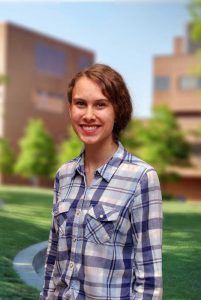Major: Chemistry
Minor: Environmental Science

Abstract: Spatiotemporal Detection of Diverse Contaminants of Emerging Concern in Chesapeake Bay Water, Sediment, and Oysters
Describe your project:
My project is on detecting contaminants of emerging concern, which are chemicals that have been recently detected, or are only persistent at virtually insignificant levels. The focus is the Chesapeake Bay, specifically its water, oysters, and sediment.
Who is your mentor for your project?
My mentor is Dr. Lee Blaney in the Chemical, Biochemical, and Environmental Engineering department. I got connected though my advisor Dr. Tara Carpenter when she realized that the research I wanted to focus on was not available through the current chemistry research opportunities at UMBC. Dr. Blaney’s lab focuses on environmental and chemical engineering research, which is what I hope to go to graduate school for.
How did you become interested in this project?
I became interested through reading the posters and papers that were previously submitted about this project. The level of detection that could be achieved of these minuet chemicals amazed me, and the direct connection to the environment I lived in made the project feel real.
What has been the hardest part about your research/what was the most unexpected thing about being a researcher?
The hardest thing about my research is the learning curve I faced when entering a chemical engineering lab. As the first chemistry major to work in Dr. Blaney’s lab, I felt slightly overwhelmed with what I was expected to accomplish. The people in the lab made the transition enjoyable and were always willing to teach me anything I didn’t know.
What has been the most rewarding part?
The most rewarding part has been becoming an expert in a subject I would have never been able to touch if I stayed within the chemistry field while an undergrad. Researching outside of my field has given me so many skills I would have never had the chance to cultivate otherwise.
How will you disseminate your research?
I am presenting my research in poster form at URCAD, the Undergraduate Research Symposium in the Chemical and Biological Sciences, and at the AAAS conference.
What is your advice to other students about getting involved in research?
My advice is to look outside your major for research. There are so many opportunities that are available to you if you are willing to step outside the box and learn a new subject from scratch.
What are your career goals?
I plan on entering industry for 1-3 years, and then apply to graduate schools to gain a graduate degree in environmental chemistry, environmental engineering, or a related field.
5/18/23